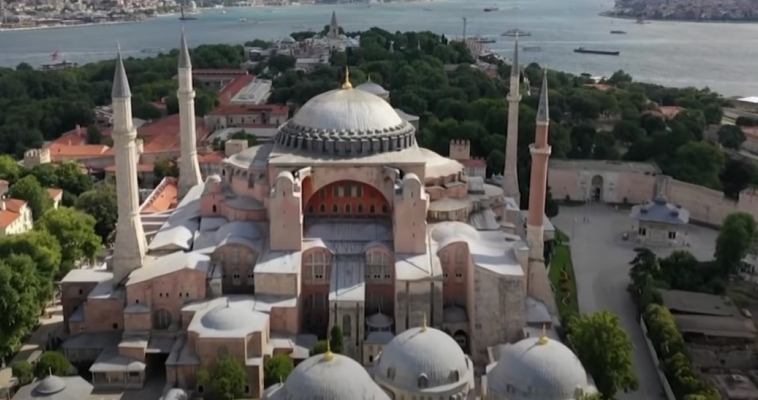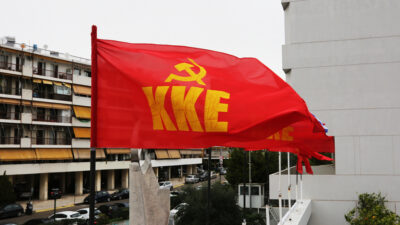Antonia Dimou: Hagia Sophia on Erdogan’s Islamic chessboard
21/07/2020
The Islamic consciousness of President Erdogan, who is at the vanguard of his current administration , was consolidated in his youth when he joined the youth of the National Salvation Party under the anti-Western Islamist Necmettin Erbakan and later in the Welfare party, with which he was elected mayor of Istanbul. Erdogan matured his Islamic political beliefs by joining the parties founded by Erbakan the Welfare Party and the Virtue Party in the 1980s and 1990s.
The ideology of both parties was based on the political-religious manifesto “National View” (Milli Görüş) published by Erbakan in 1969. This promoted, on the one hand, the replacement of the secular character of modern Turkey created by Ataturk as well as his moral values, and on the other hand the ideological reconstitution of the Ottoman Empire, with the restoration of Turkish influence in the Balkans and the wider Middle East.
Fanatic Islamist supporters of Erbakan’s parties have repeatedly protested outside Hagia Sophia in the past, demanding a change in use from a museum to a mosque and an end to interfaith dialogue, as was the case in 2006. It was then that one million protesters outside the Hagia Sophia, had declared the head of the Catholic Church unwelcome. The Pope was to pay an official visit to Turkey, at the invitation of former President Ahmet Sezer.
Erbakan’s Islamic path is being faithfully followed by the current president of Turkey, with disrespect for religious freedom, discrimination against religious minorities and the conversion of Hagia Sophia into a mosque as the cornerstone of neo-Ottomanism. .
A point of reference for Muslims
The presidential decision to alter the character of the historical-religious monument of Hagia Sophia and turn it into a mosque was based on the annulment decision of an ostensibly democratic institution, the Council of State, on a relevant decree of 1934. The decree defined the status of the Hagia Sophia as a museum and is the link in the chain of timeless plans of Turkish Islamic parties to reconnect with the Ottoman past.
Apparently, the Turkish president is instrumentalizing Hagia Sophia in order, on the one hand, to strengthen the ruling party electorally, calling on extreme, Turkish religious nationalism, and on the other hand, to become a leading figure in the Arab-Islamic world. In order to realize the latter, by turning the Hagia Sophia into a mosque, he is trying to make Constantinople equal to Jerusalem and Mecca.
That is, to make it a new center of Sunni Islam, at which every Muslim must pray at least once in his life. The announcement of the decision on the Hagia Sophia provoked mixed feelings in the Arab-Islamic world, as reflected on social media, with the prevailing sentiment being that of accepting the Turkish president as a decisive leader who restored Islamic order to a historical-religious site.
It is also noteworthy that critical views were expressed against Erdogan’s decision, arguing that it was opening the door to religious intolerance and bigotry, flirting with extremist Islamist organizations (such as Hamas) and undermining the moderate Arab leaders that espouse the peaceful coexistence of religions.
Erdogan’s doublespeak
This argument was reinforced by the official statement on Hagia Sophia signed by the Turkish President in English and Arabic, as the English text (addressed to the Western audience) states that “the doors of Hagia Sophia will be, as is the case with all our mosques, open to all, whether they are foreigners or locals, Muslims or non-Muslims “.
But in the Arabic text, addressed to the Arab-Islamic world, he points out that “the revival of Hagia Sophia is a sign of the restoration of freedom in the Al-Aqsa Mosque” and elsewhere states that “the resurrection of Hagia Sophia is a greeting from our hearts to all the cities that symbolize our culture, from Bukhara to Andalusia “.
Erdogan’s doublespeak, as reflected in the differences between the British and Arabic statements, should serve as a wake-up call for Turkey’s neo-Ottoman and Islamist course and activate Western governments to realize the new reality in time.
After all, Erdogan’s instrumentalization of Hagia Sophia sends the message everywhere that the secularism of the Turkish state is in danger and that, as a result of words and deeds, he is trying to become a world class leader and exponent of pan-Islamism (i.e. the union of all Muslims everywhere for the dominance of Islam).
President Erdogan’s bet is to lead an “Islamic Spring” and dominate ideologically, where the leaders of the “Arab Spring” have failed. Wagering, however, on the international environment hides risks and pitfalls, which sometimes those who make these bets fall into.





